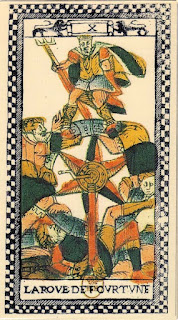One of the things that occasionally shows up in rule sets is the idea of "luck" as being something that a character can have that is not connected to the normal luck of dice rolling. For instance, in Fantasy Wargaming, almost every interaction with the rules is affected by a luck roll that can itself be modified by the native luck of the character (as a special ability gained during character creation). In GURPS, there are several types of luck advantages, each of which allows varying benefits, such as re-rolling dice (the most common) or narrative benefits (like "Serendipity", which forces the GM to include one "fortuitous but plausible coincidence" per game session). CORPS Luck causes all rounding done in any calculation (except character creation and calculations that do not directly affect the character) to be in the player's favor. Some games have Luck as a characteristic (such as Tunnels & Trolls and Flashing Blades) or as a roll based on a characteristic (the Luck rolls of Basic Roleplaying and its progenitor, RuneQuest, both of which are based on the Power characteristic).
But what is "luck"? Why should it be different than just the result of the series of dice rolls made during the game?
Obviously, in those games which include it as a separate concept, luck is an active force in the game world. Rather than being a description of events after the fact, it is a prescriptive concept that rests in certain people and not in others. It (usually) can have the qualities of "bad" or "good", so that those cursed with bad luck see detriments in the game world, while those blessed with good luck see benefits. From this, we can conjecture that it must be an actual force in the world, and not just a description of relative fortune.
The term came late to English, but was based on much older concepts in Northern European (Germanic, Scandinavian, and Celtic, mainly) societies. In those societies, the success of a community, or a person, derived from its connection to the invisible world. In most cases, the community would have a connection through its sacrificial religion, especially through the institution of sacral kingship, which is the origin of political kingship. In this institution, a person would be chosen as the representative of the community to act as a sort of high priest. His (or sometimes her) duties would include observing various ritual taboos, engaging in ritual activities, and living a virtuous life. Failure in any of these was thought to bring ruin on the community. An individual would have a similar connection through his or her particular ritual and personal actions that would affect his or her life. For instance, a person might build his house on an elf path and see his luck drain away, or she might sing a particularly pleasant song in a place that the elves are present and find that she is afterward living a charmed life. On the larger scale, a bad king (for instance, one who gave bad judgments) would bring ruinous weather, unchecked banditry, and failed crops to his community, while a good one who observed his taboos, was pious, and embodied the virtues of his people would see pleasant, peaceful days and bountiful harvests under his reign.
So, "luck" was the favor of the invisible world. That matches pretty well with RuneQuest and Basic Roleplaying, where Power is also the characteristic that is associated with spirits and magic. It also fits well in games like Flashing Blades, where God has ordered lives for good or ill. What would be interesting would be to see ways of affecting the luck rolls and advantages. Luck could be used as a way of enforcing alignment (or whatever) restrictions, by making characters who do not live up to their professed philosophies lose luck, and those who hew closely to the restrictions of their ethos gain it.
(Inspired by a couple of comments here.)








This made me think about how the "luck" of characters in the Icelandic sagas is not a static thing. People are always doing things that affect their luck - usually adversely. One example among many: In the Saga of the Faroe Islanders, Sigmund overturns a boat containing his adversary Thrand and his men. He has Thrand at his mercy, but (against the advice of his companions) decides to spare him, and sails away. As Thrand clambers out of the water, he remarks, "Sigmund's luck must have left his side for mine now, for it was a bad misjudgement he made when he did not kill us when he had the chance." Sure enough, Sigmund's death follows soon after. Luck seems often to be tied to wisdom in the sagas. Maybe letting Thrand go was a "good" act, but it was not a wise one. So maybe, for a Norse-themed game at least, luck should be affected by Wisdom (a modifier to saving throws?) rather than alignment behaviour. I suppose it already is in RuneQuest/BRP, if one considers POW to be the equivalent of D&D's Wisdom.
ReplyDeleteThanks for a thought-provoking post. I need to ponder this some more.
Exactly so. The sagas are a great source of information on this concept. It also resembles, in some ways, the South Pacific idea of mana, which is not just "spell points". It is more similar to the point value of a character in a point-build game or to the experience point total in D&D. It is a measure of the success and influence of a person, both in ways that we would consider natural and in terms of the invisible world.
DeleteIf you have any more insights, please feel free to share them.